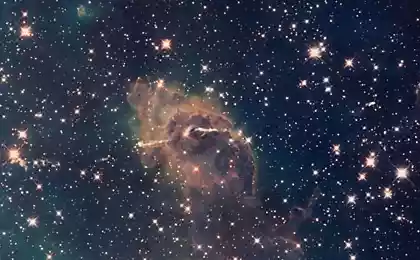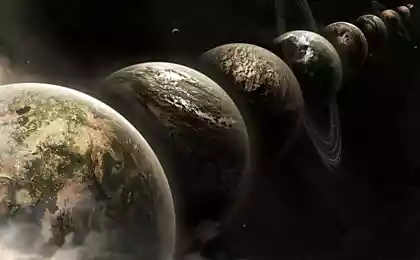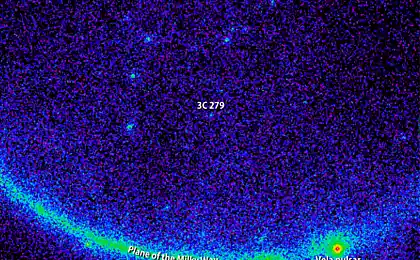846
The Fermi paradox: are we alone in the Universe?
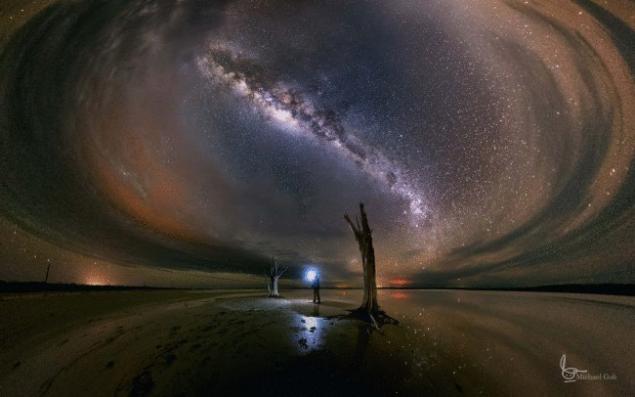
I think around the world is that, they find themselves in a good location with a view of the stars good starry night and looking up, has no emotions absolutely. Some just feel grooving epic beauty, and some think about the greatness of the Universe. Someone immersed in the good old existential maelstrom, feeling strangely at least half an hour. But all feel something.
Physicist Enrico Fermi also felt something: "Where is everybody?".
The starry sky seems huge, but everything we see is part of our small yard. In the best case, when there were no settlements absolutely, we see about 2,500 stars (that is, one one hundred millionth of the stars in our galaxy), and almost all of them are less than 1000 light years from us (1% of the diameter of the milky Way). In fact, we see this:
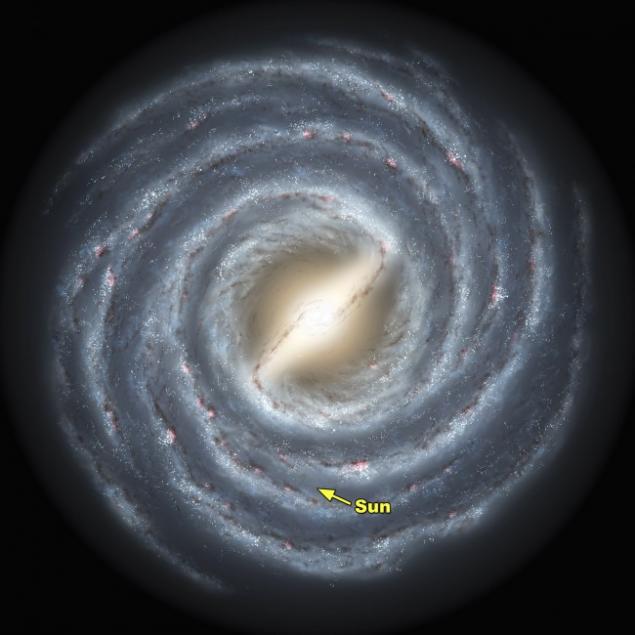
When faced with the topic of stars and galaxies, people will inevitably begin to wonder, "is there intelligent life there?". Let's take some numbers.
In the observable universe almost as many galaxies as there are stars in our galaxy (100 – 400 billion), so every star in the milky Way is our own galaxy beyond. Together, they are in the order of 10^22 – 10^24 stars in total, that is, in every grain of sand on Earth there are 10,000 stars out there.
The scientific community has not yet come to a common agreement about what percentage of those sun-like stars are presented (similar in size, temperature and luminosity) — opinions typically limited to 5-20%. If you take the most conservative estimate (5%) and a lower limit to the total number of stars (10^22), the Universe will be 500 quintillion, or 500 billion billion sun-like stars.
There is also a dispute about what percentage of those sun-like stars will have earth-like planet (earth-like planet, with similar temperature conditions that allow the existence of liquid water and potentially support life). Some say that their can be up to 50%, but a conservative estimate of the recent PNAS study showed that there will be no more and no less than 22%. This suggests that potentially habitable earth-like planets rotate at least around 1% of the total number of stars in the Universe — a total of 100 billion billion earth-like planets.
So there are hundreds of earth-like planets for every grain of sand in our world. Think about it next time you're at the beach.
Moving on, we have no choice but to remain within the purely theoreticaly. Let's imagine that after billions of years of existence 1% of earth-like planets develop life (if that's true, every grain of sand would represent one planet with life). And imagine that on 1% of those planets life was able to reach the level of intelligence similar to earth's. This would mean that the observable universe there are about 10 quadrillion, or 10 million million intelligent civilizations.
Back to our galaxy, and will do the same trick with a lower limit of the rating stars in the milky Way (100 billion). Get a billion earth-like planets and 100,000 intelligent civilizations in our galaxy alone.
SETI ("search for extraterrestrial intelligence") is an organization that is committed to trying to hear the signals of other intelligent life. If we are right and our galaxy is 100,000 or more intelligent civilizations, and at least a portion of them sends out radio waves or laser beams, trying to contact other, SETI had to catch these signals at least once.
But I didn't. No. Never.
Where is everyone?
It's weird. Our Sun is relatively young by the standards of the Universe. There are stars with much older planets of the earth type who is also older, which in theory ought to say about the existence of civilizations far more advanced than our own. For example, let's compare our Earth's age of 4.54 billion years with a hypothetical planet X age of 8 billion years.
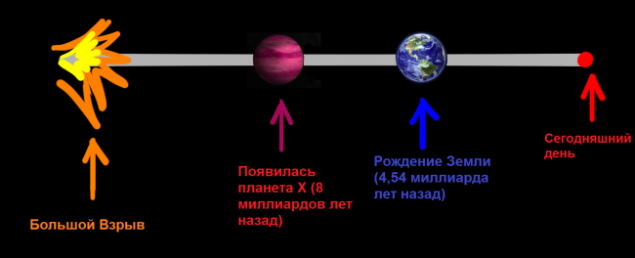
If planet X will be similar to the earth's history, let's see, where should be its civilization today (orange period will show how great the green):
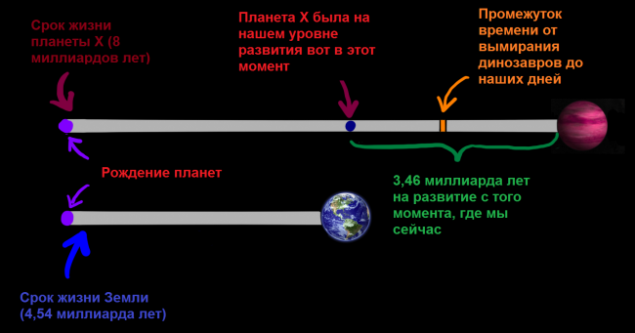
Technology and knowledge civilization, which is older than our a thousand years, can shock us just like the world of the middle ages. Civilization, which is ahead of us in a million years, may be incomprehensible to us as human culture is to chimpanzees. And planet X, for example, is 3.4 billion years ahead of us.
There is a so-called Kardashev scale, which helps us to define intelligent civilizations into three broad categories depending on the amount of energy they use:
- A type I civilization uses all the energy of your planet. We have not yet reached of a type I civilization, but close to this (Carl Sagan called us civilization 0.7).
- A type II civilization uses all the energy of their home star. Our weak brains can hardly imagine how it is, but we tried drawing something like a Dyson Sphere. It absorbs energy radiated by the Sun and can redirect to the needs of civilization.

- Type III civilization blows the previous two, using energy comparable to that produces the entire milky Way.
One of the hypotheses about how can occur the colonization of the galaxy, is to create a machine that can fly to other planets, spend 500 years or so, focusing on self-replication using raw materials of the planet, and then send two replicas to do the same. Even without having to travel at the speed of light, this process would have colonized the whole galaxy in just 3.75 million years, a moment by the standards of billions of years of existence of the planets.
Continue to meditate. If 1% of intelligent life survives long enough to become a potential colonizing the galaxy with a type III civilization, our calculations above suggest that only in our galaxy must be at least 1,000 type III civilization and, given the strength of these civilizations, their presence hardly would go unnoticed. But nothing, nothing we see, hear, nobody attends.
Where is everyone?
Welcome to the Fermi paradox.
We have no answer to the Fermi paradox — the best we can do is "possible explanations". And if you ask ten different scientists, you will get ten different answers. What would you think about people of the past that discuss a round or flat Earth, it revolves around the Sun or she is around him, do gives lightning Almighty Zeus? They seem so primitive and primeval. The same can be said about us, to talk about the Fermi paradox.
Looking at the most discussed possible explanations for the Fermi paradox, it is necessary to divide them into two broad categories — those explanations which assume that there are no signs of civilizations of type II and III no, because they simply do not, and those that assume that we can't see or hear them for some reason:
I group explanation: no signs of a superior civilization (II and type III) no, because there are no higher civilizations do not exist, Those who adhere to the explanation of group I indicate that is called the problem of exclusivity. She rejects any theory that says: "There are higher civilizations, but none of them tried to contact us because they are all... ". People group I looked at the mathematics that says that there must be thousands or millions of higher civilizations, so at least one should be an exception to the rule. Even if the theory supports the existence of 99.9% of higher civilizations, the rest of the 0.01% will be different, and we know for sure.
Thus, say the supporters of the explanations of the first group, sverhrazdutaya of civilizations does not exist. And since the calculations are talking about thousands of such in our galaxy alone, there must be something else. And this something else is called the Great filter.
The Great filter theory says that at a certain point from the origin of life to the civilization III type is a kind of wall, which hit almost all of life's attempts. It is a certain step in a long evolutionary process through which life almost can not pass. It's called the Great filter.
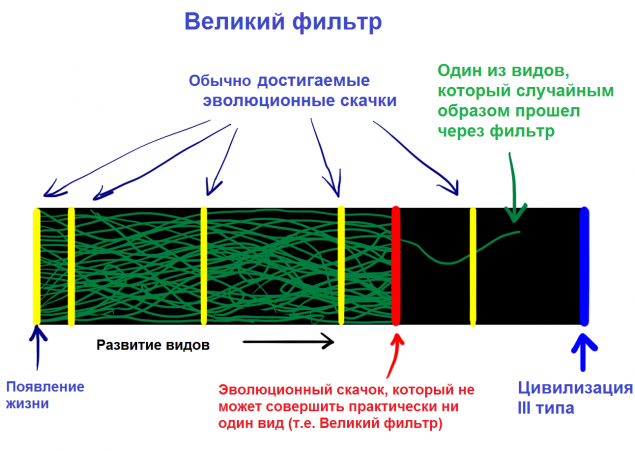
If this theory is correct, the big question remains: at what point in time there is a Great filter?
It turns out that when it comes to the fate of humanity, this question becomes very important. Depending on where the Great filter occurs, we're left with three possible realities: we're rare, we're first or we're dead.
1. We're rare (the Great filter is behind us)
It is hoped that the Great filter is behind us — we've been through it, and it would mean that life is extremely difficult to evolve intelligence to our level, and it happens very rarely. The diagram below shows that only two have done it in the past and we are one of them.
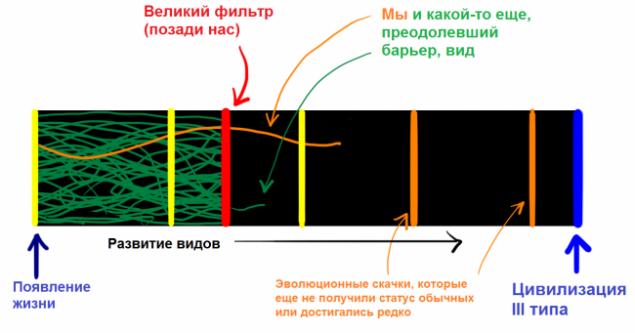
This scenario could explain why civilizations type III no... but it would also mean that we can be one of the few exceptions. That is, we have hope. At first glance, it looks just like people believed that the Earth was at the center of the universe 500 years ago — thought they were special, and today we might think the same thing. But the so-called "effect of selective observations" said that regardless of whether our situation is rare or quite common, we will strive to see first. This leads to the fact that we allow for the possibility that we are special.
And if we are special, when exactly did we become special — i.e. what step we were where others get stuck?
One possibility: the Great filter could be at the beginning — thus, the very beginning of life was an extremely unusual event. This option is good because it took billions of years that life has finally appeared, and we tried to repeat this event in the laboratory, but nothing happened. If the blame of the Great filter, it would mean not only that the Universe may not be intelligent life, it would say that life in General may not be outside of our planet.
Another possibility: the Great filter could be the transition from simple prokaryotic cells to complex eukaryotic cells. After the prokaryotes are born, they need at least two billion years before they will be able to make an evolutionary leap, hard to get -. If this is the whole of the Great filter, this may indicate that the universe is teeming with simple eukaryotic cells and all.
There are a number of other possibilities — some even think that even our recent jump to the present intelligence can be a sign of a Great filter. While the leap from semi-intelligent life (chimps) to intelligent life (humans) doesn't seem miraculous step, Steven Pinker rejects the idea of inevitable rise in the process of evolution: "Since evolution does not set a goal but just happens, it uses the adaptation, which will be useful for specific ecological niches, and the fact that it's on the Ground has led to technological intelligence, by itself, suggests that this outcome of natural selection is very rare and is not the usual consequence of the evolution of the tree of life".
Most jumps are not regarded as candidates for the Great filter. Any possible Great filter must be a thing from the category of one in a billion, when it should be something incredibly strange to provide a crazy exception — for that reason, the transition from unicellular to multicellular life is not taken into account because it is only on our planet it has occurred 46 times in the form of isolated events. For the same reason, if we find a fossilized eukaryotic cells on Mars, they are not a sign of a Great filter (and nothing else that happened up to this point in the evolutionary chain) — because if the Earth and Mars that happened then will happen somewhere else.
If we are indeed rare, this may be due to a strange biological event, but also related to what is called the hypothesis of "rare Earth", which says that there may be many earth-like planets with earth like conditions, but some conditions on Earth — the specifics of the Solar system, relationship with the Moon (big Moon rare for such small planets) or something in the planet can make it extremely friendly to life.
2. We are the first
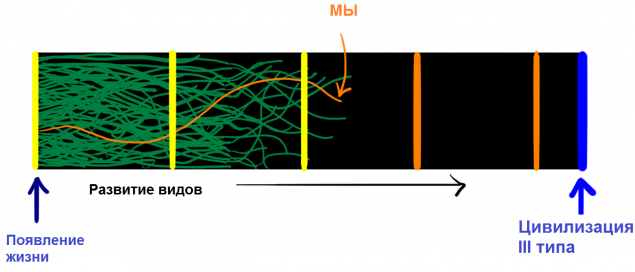
Adherents of the first group believe that if the Great filter is not behind us, it is hoped that the conditions in the Universe just recently, for the first time since the Big Bang were such that allowed for the development of intelligent life. In this case, we and many other species can be on the road to superintelligence, and just before that, no one came. We were in the right place at the right time to become one of the first super-intelligent civilizations.
One example of a phenomenon that could make this explanation possible is the prevalence of gamma-ray flares, gigantic explosions that we observe in distant galaxies. Just as the young Earth took several hundred million years before the asteroids and volcanoes died down, giving way to life, the universe could be filled with cataclysms like gamma-ray flashes, which burned all that from time to time could be a life up to a point. Now, perhaps, we are in the middle of the third astrobiology stage of transition, when life is able to develop such a long time and it is not obstructed.
3. We're fucked (the Great filter is ahead)
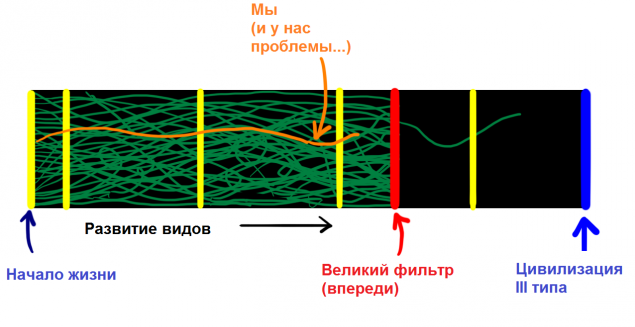
If we are not rare and not the first, among the possible explanations of group I is the fact that the Great filter still awaits us. Perhaps life regularly evolves to the threshold on which we stand, but something prevents it to develop further and to grow to high intelligence in almost all cases — and we are unlikely to be an exception.
One of the possible Great filters regularly occurring catastrophic natural event like the aforementioned gamma-ray flashes. Perhaps they are still not completed, and remains only a matter of time before all life on Earth suddenly divided into zero. Another candidate is the possible inevitability of self-destruction of all advanced civilizations after reaching a certain level of technology.
That is why Oxford University philosopher Nick Bostrom says that "no news is good news". The discovery of even simple life on Mars would be devastating, because it would cut the number of potential Great filters behind us. And if we find fossils of complex life on Mars, according to Bostrom, "this is the worst news in the history of mankind, published in the newspaper", because it would mean that the Great filter almost certainly be found. Bostrom believes that when it comes to the Fermi paradox, "the silence of the night sky is Golden."
Group II explanation: civilization II and type III exist, but there are logical reasons that we can't hear them

Group II explanation gets rid of any mentions of our rarity or uniqueness — on the contrary, its followers believe in the principle of mediocrity, the starting point of which is nothing rare in our galaxy, solar system, planet, level of intelligence, until evidence does not testify to the contrary. Also they are not going to say that the lack of evidence of higher intelligence speaks of their absence as such — and I emphasize the fact that our search for signals stretches only about 100 light years from us (0.1% of the galaxy). Here are ten possible explanations for the Fermi paradox from the point of view of group II.
1. Super-intelligent life has already visited Earth, long before we got there. In this scheme of things real people have been here for about 50,000 years, which is relatively low. If contact happened before our guests just lonely plunged into the water, and that's it. In addition, recorded history goes back only 5,500 years — perhaps a group of ancient tribes of hunter-gatherers faced with the unknown, extraterrestrial garbage, but have not found a way to remember or record this event for future posterity.
2. The galaxy is colonized, but we just live in some desolate rural location. Americans could be colonized by Europeans long before a small tribe of Inuit in Northern Canada realized it had happened. It may be an urban moment in the colonization of the galaxy, when the types are going next door for convenience, and it would be impractical and pointless to try to contact someone in that part of the spiral galaxy in which we find ourselves.
3. The entireconceptof physical colonization is a fun idea of antiquity for more advanced types. Remember, the image of a civilization of type II in the sphere around its star? With all the energy they could create a perfect place for himself that satisfies all needs. They could incredibly reduce the need for resources and to live in a happy utopia, instead of looking at the cold, empty and undeveloped Universe.
Even more advanced civilization might view the entire physical world as a horribly primitive place, long ago conquered their own biology and downloading their brains into a virtual reality Paradise for eternal life. Life in the physical world of biology, mortality, wants and needs might appear primitive for such creatures as we think primitive life in a cold dark ocean.
4. Somewhere out there, there are terrible predatory civilization, and most intelligent life knows that to broadcast any outgoing signal, thereby giving its location, is extremely unwise. This embarrassing moment could explain the absence of any signal received by the SETI satellites. It also could mean that we were just naive beginners who foolishly risky given your location. There is a dispute on the subject of whether we should attempt to contact an extraterrestrial civilization, and the majority of people come to the conclusion that no, it's not worth it. Stephen Hawking warns, "If aliens visit us, the consequences will be worse than when Columbus landed in America, which for native Americans was clearly not very well." Even Carly Sagan (who firmly believed that any advanced civilization that has mastered interstellar travel would be altruistic, not hostile) called the practice of METI "extremely unreasonable and immature" and advised that "a newborn in a strange and incomprehensible space to sit quietly and listen for a long time, patiently learning and absorbing, before shouting into the unknown that we don't understand".
5. There is only one representative of the highest intellectual life — civilization "predators" (like people here on Earth) — which is far more advanced than all the others, and held afloat due to the destruction of any intelligent civilization once it reaches a certain level of development. It would be extremely bad. It would be extremely unwise to destroy civilization, wasting resources, because most of them itself would become extinct. But after a certain point intelligent species can begin to breed like a virus and soon colonize the entire galaxy. This theory implies that whoever settled in the galaxy first, he wins, and anyone else the chance is no more. This could explain the lack of activity, because it would reduce the number of super-intelligent civilizations to just one.
6. Somewhere there is activity and noise, but our technology is too primitive and we're not trying to hear that. You go into a modern building, turn on the radio and trying to hear something, but send text messages, and you decide that the building is empty. Or, as said Carl Sagan, our minds can work at times slower or faster than the minds of other intelligent forms: they needed 12 years to say "hi", but when we hear, for us it's white noise.
7. We are in contact with intelligent life, but the authorities hide it. This theory is completely idiotic, but we have to mention.
8. Higher civilizations know about us and are watching us (the"zoo hypothesis"). As far as we know, super-intelligent civilizations exist in a tightly-regulated galaxy, and our Earth is considered something of a national nature reserve, protected and large, with a sign "look but don't touch". We do not notice them, because if an intelligent species wanted to observe us, he would know how to hide from us with ease. Perhaps there is indeed a kind of "Prime Directive" of "Star trek," which prohibits super-intelligent beings to come into any contact with the younger types, until they reach a certain level of intelligence.
9. Higher civilization here, all around us. But we're too primitive to perceive them. Michio Kaku explains it this way: "let's Say we have an ant hill in the middle of the forest. Next to an anthill built a highway out of ten bands. Question: "will you see the ants, what are desyatiballnoy highway? Can ants understand the technology and intentions of the beings building the highway next to them?".
Thus, we not only can't pick up the signals from planet X using our technology, we don't even understand what you are doing creatures from planet X. on their part, an attempt to enlighten us would be like trying to teach ants to use the Internet.
This could also answer the question: "well, if so many incredible civilizations type III, why are they still not contacted us?". To answer this question, let us ask ourselves: when Pizarro went to Peru, if he stayed in front of the ant to chat? Was he magnanimous, trying to help the ants in their hard cases? He was hostile and stayed from time to time, hated to burn the ant? Or he was deep drum? It is the same.
10. We are completely mistaken in their understanding of reality. There are lots of options that could divide by zero our ideas. The universe may be something like holograms. Or we are aliens, and we were put here as an experiment or fertilizer. There's even a chance that we are all part of a computer simulation of some scientists from another world, and other forms of life simply weren't programmed to appearance.
* * *
As our journey continues, we continue to look for extraterrestrial intelligence, is not entirely clear what to expect. If we learn that we are alone in the Universe, or will officially enter the galactic community, both options are equally terrible and equally blow the mind.
In addition to its fantastic shocking component, the Fermi paradox leaves people with a deep sense of humility. This is not the usual "I'm a germ and I live three seconds", which occurs when thoughts about the Universe. The Fermi paradox is more clear, the personal humility that can come only after hours spent exploring the most incredible theories, presents the best scientists that constantly change the minds and contradict each other. He reminds us that future generations will likewise look at us like we look at the ancient people who thought that the stars are fastened to the wooden sky, and wonder: "Wow, they really had no idea what was happening."
All of this hits our self-esteem along with talks about civilizations II and type III. Here on Earth, we're kings of their little castle, proudly ruling the handful of fools who share the planet with us. And in this bubble with no competition and no one will criticise us, we have no one with whom to discuss the problem of existence, but ourselves.
All this suggests that we, the people, probably, not so smart, sit on a tiny rock in the middle of a desolate Universe, and even have no idea what could be wrong. But we may be wrong, let's not forget that in trying to justify their own greatness. We have no idea that somewhere there is a story in which we even the letters are not present to — dot, comma, page number, bookmark.published
Materials WaitButWhy.com
Source: hi-news.ru
